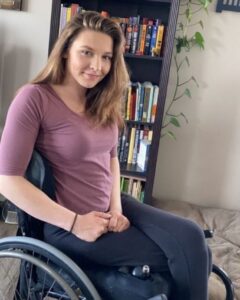When I was 14, I spent the night at my friend’s. Her dad barely spoke. At 2 a.m., I saw a hidden camera in the room. Panicked, I covered it with a blanket. Minutes later, her dad barged in, yelling, “Idiot! This is a…”
“…heat sensor, not a camera!” he finished, red-faced and fuming. I stood frozen, my heart racing so loud I thought he could hear it. My friend, Alina, woke up with a gasp and sat up, confused and half-asleep.
Her dad glared at me, then walked out, muttering something about “kids these days.” I felt embarrassed but mostly suspicious. Who puts a heat sensor in their daughter’s room—pointing right at her bed?
Alina shrugged it off. “He’s just weird,” she said, pulling the blanket back over her head. But something didn’t sit right with me. My parents never even let me close my door all the way. The idea of installing high-tech gadgets in a teenager’s room felt off.
I didn’t sleep the rest of the night. I lay there, staring at the ceiling, every little sound making my skin crawl. The house was too quiet, like the walls were listening. The next morning, I left early, telling Alina I had a stomach ache.
I didn’t tell anyone—not my parents, not my older sister. I thought maybe I was overreacting, that maybe it really was just a heat sensor. But I never went back to Alina’s house again.
For a while, life moved on. We stayed friends, though more at school than outside it. She never asked me to come over again, and I never offered.
Then three years later, everything changed.
I was scrolling through a local news app my mom had installed on my phone to “stay informed.” I usually ignored it, but a headline caught my eye.
“Local Man Arrested for Secret Recordings in His Home”
I clicked on it, my hand trembling before I even saw the photo. And there he was—Alina’s dad, looking older, heavier, but unmistakably him. The article said he had installed cameras in multiple rooms of the house, including the bathrooms and bedrooms. The police had found dozens of tapes and drives hidden in a locked filing cabinet.
I felt sick. The heat sensor hadn’t been a heat sensor. It was real. All of it. That night I covered it with a blanket, I had been right to panic. But back then, I was just a kid. What could I have done?
I read the whole article, twice. It said one of his own family members had tipped off the authorities. My first thought was: Alina.
I tried texting her, but the message didn’t go through. I found her Instagram, but she hadn’t posted in months. No stories, no posts, nothing.
For weeks, I kept checking. I asked a mutual friend if she had heard from her. She just shook her head. “I think they moved,” she said. “Like, far away. Probably changed schools.”
It haunted me. Not just what he did, but how close I had come to being another blurred-out face in some court exhibit.
Years went by. I went to college. Life got busy. That memory became one of those “weird things from childhood” you lock up in a mental box and only open on restless nights.
Then, in my junior year of college, I got a message from someone named Ana_Laura89. I almost deleted it thinking it was spam, but the profile picture caught my eye.
It was Alina.
She looked different—older, more serious, like someone who’d lived a hundred lives since we last spoke. Her message was simple.
“Hey. I’ve wanted to reach out for a long time. Can I call you?”
I gave her my number, and she called that night. We talked for three hours.
She told me everything.
She had known, deep down, that her dad wasn’t normal. She hadn’t seen the cameras until a few months after that night I stayed over. But when she did, she froze. She told her mom, who didn’t believe her at first. Her dad convinced her mom it was for “security” because of “rising crime.”
But then Alina found the recordings.
She didn’t tell me how or where. She just said she saw things she could never unsee. And the worst part? She recognized some of the girls. Friends from school. Sleepovers. People who trusted them.
It was Alina who told her older cousin, who was a law student at the time. He convinced her to take pictures of the setup and stash them in a locker at school.
It was risky. She was terrified every day. But eventually, her cousin went to the police with everything. The rest, as I already knew, became public.
They had to move to another city after that. Her dad went to prison. Her mom changed jobs and started therapy. Alina, though, said she stopped trusting anyone for a long time.
“After what he did, I kept thinking… was I part of it by doing nothing?” she said.
I told her about that night. About how I had covered the “sensor” and felt something was wrong. About how scared I had been.
She went silent for a moment. Then she said, “I think that night changed everything.”
I didn’t understand.
She explained that after I left, her dad had been on edge. Paranoid. He moved the devices. But in doing so, he left wires exposed—just enough for Alina to notice one poking out from the back of her closet a few weeks later.
If I hadn’t reacted the way I did, she said, he might have kept it all hidden longer. Maybe long enough to hurt more people. Maybe forever.
I didn’t know what to say. I just sat there holding the phone, heart pounding like I was 14 again, staring at that red light in the dark.
We stayed in touch after that. Slowly, cautiously, like people relearning trust.
A few months later, she messaged me again. This time with a different kind of news.
“I’m speaking at a local youth shelter next week. Telling my story. I’m scared, but I think I have to.”
I told her I was proud of her. And I was.
She sent me a photo of the event. She was standing in front of a group of teenage girls, holding a microphone, her face calm and serious. There was a poster behind her that read: “Your Gut Is a Gift. Listen to It.”
She told them the truth—not in graphic detail, but in the way someone who’s survived something terrible can offer light without reliving the darkness.
The shelter staff said one of the girls came forward that night with something she’d been keeping secret. Something she was too afraid to say out loud until Alina showed her it was possible to speak and still be okay.
That girl ended up going to the police. Her stepfather is now under investigation.
That moment changed something in me, too.
I started volunteering at that same shelter during the summers. I didn’t tell them my whole story, just that I knew what it was like to be young and scared and unsure of what to trust.
Sometimes the smallest signs—like a blinking red light—can be the start of something much bigger. Sometimes you don’t even realize your fear saved someone else.
I used to think that night at Alina’s house was just a weird memory. But now I know it was a beginning.
It taught me to trust my instincts, to speak when something feels off, even if it’s uncomfortable.
It taught me that silence helps the wrong people, and one voice, no matter how small, can lead to justice.
And maybe the biggest lesson?
You don’t have to be a hero to make a difference. You just have to act when it matters.
If you’ve ever felt something wasn’t right and kept quiet—ask yourself this: What if your voice could save someone?
Please share this if it spoke to you. Your story might help someone else feel less alone.




